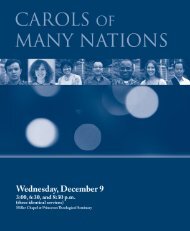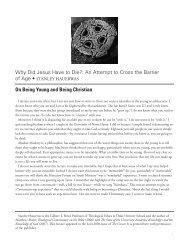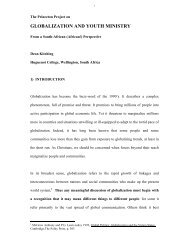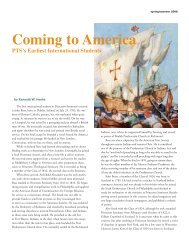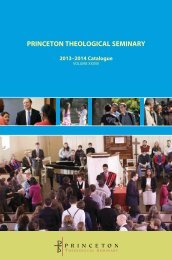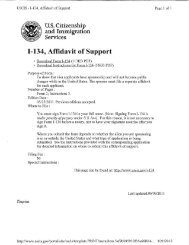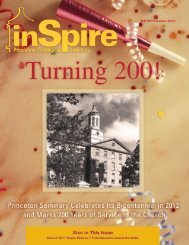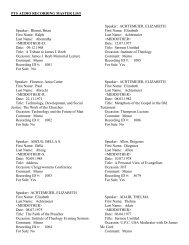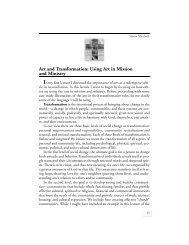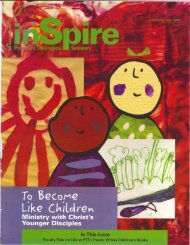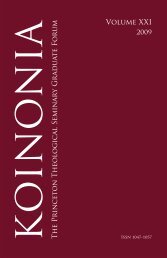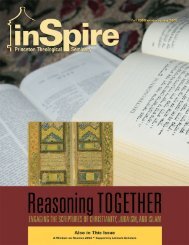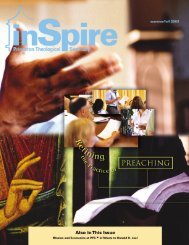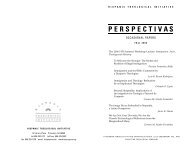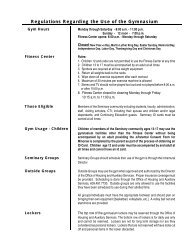PTS Catalogue - Princeton Theological Seminary
PTS Catalogue - Princeton Theological Seminary
PTS Catalogue - Princeton Theological Seminary
Create successful ePaper yourself
Turn your PDF publications into a flip-book with our unique Google optimized e-Paper software.
OT3255 Job, Literature, and Modernity<br />
This course explores the modern reception of the book of Job and the question<br />
of human suffering from the seventeenth century to contemporary literature. The<br />
focus will be on philosophers (including Kant, Hegel, Kierkegaard, Martin Buber,<br />
Ernst Bloch, Richard Rubenstein, Antonio Negri) and poets (including Milton, Pope,<br />
Hopkins, Elizabeth Brewster, Robert Frost, and Dahlia Ravikovitch), writers of fiction<br />
(Melville, Dostoevsky, Goethe, Kafka, Joseph Roth, Muriel Spark, Bernard Malamud)<br />
and plays (e.g., Sholem Aleichem, Archibald MacLeish). In addition to the Coen<br />
Brothers’ film, A Serious Man, we will also consider modern renderings of Job in<br />
the visual arts and music.<br />
<br />
<br />
graduate seminar.<br />
<br />
Spring Semester 2012–2013; Mr. Seow and Ms. Esther Schor<br />
English Exegesis courses that fulfill “close reading of the text” requirement<br />
OT3300 Introduction to English Bible Exegesis: Genesis<br />
Introduction to exegetical method and close reading of the Bible using the English<br />
text of Genesis.<br />
<br />
<br />
<br />
Spring Semester, 2013–2014; Mr. Olson<br />
OT3301 God in the Old Testament<br />
This course will focus on the central word of the Old Testament, its witness to<br />
the God of Israel who was incarnate in Jesus Christ. Such topics as the character<br />
or attributes of God, the presence of God, the knowledge of God, distinctiveness<br />
and commonality in relation to other religious views of God, the role of anthropomorphic<br />
language, and the history of God will be considered. Exploration of these<br />
matters in the context of the Old Testament as a whole, and as they affect the way<br />
in which we think about Christian theology.<br />
<br />
<br />
<br />
Spring Semester, 2012–2013; Mr. Seow<br />
OT3310 Exegesis of Judges<br />
The Book of Judges comprises a collection of stories about Israel’s Iron Age I past<br />
written by scribes in the Iron Age II period. The stories are at times shocking, at<br />
times humorous, and at times frustratingly terse. Yet they offer a unique portrayal<br />
of Israel’s early history. How does Judges conceive theologically of Israel’s history?<br />
How does the book relate to the archaeological evidence from Israel? How are<br />
these stories similar to and different from stories told by other ancient Near Eastern<br />
cultures? How can we read these stories of Israel’s history with some awareness of<br />
our own social location as readers? These and other questions will guide our exam-<br />
!# 94#"<br />
cat1213



